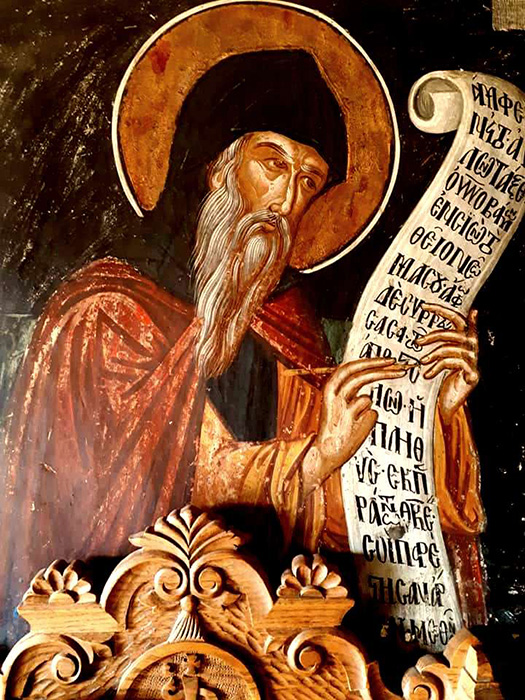Saint Kosmas the Poet, Bishop of Maiuma
Saint Kosmas the Poet, Bishop of Maiuma
Verses
Kosmas departed where there is all delight,
Leaving behind his music for the delight of the Church.
Our Venerable Father Kosmas the Poet, Bishop of Maiuma, is also known as the Hagiopolites ("of the Holy City"), namely of Jerusalem.
When he was very young, he was left an orphan, therefore he was adopted by the father of Saint John of Damascus, whose name was Sergius, and he made him his foster-son.
Because Sergius was a man of high rank and great wealth in that city, he took into his home a wise and learned teacher, whose name was also Kosmas.
This Kosmas, also known as Kosmas the Monk, was from Sicily where he became a monk, and having been captured there in a raid by the Saracens, he was brought to Damascus, where he was bought by Sergius.
Kosmas the Monk taught young John and Kosmas every form of divine and human wisdom. In a short time they had a complete knowledge of grammar and philosophy, as well as astronomy, music and geometry. In this way they became revered and respected by all.
After they received a well-rounded education, the two brothers went to Jerusalem in 743 to become monks at the Lavra of Saint Savvas.
Together the two brothers helped defend the Church against the heresy of Iconoclasm and wrote many noteworthy hymns for the Church. Meanwhile they never ceased to live a strict life of asceticism, with fasting, vigils and prayer.
After this, the blessed John was ordained a Presbyter by Patriarch John of Jerusalem. And with much motivation from the Synod of Jerusalem, the renowned Kosmas was made Bishop of Maiuma, the port of ancient Gaza.
There he shepherded his flock well and in a God-pleasing manner, and led them to salvation. Having attained a deep old age, outliving his foster-brother John by many years, he reposed in peace.
As a learned prose-author, Kosmas wrote commentaries, or scholia, on the poems of Saint Gregory the Theologian. He is regarded with great admiration as a poet.
Both Saint Kosmas and Saint John of Damascus are considered to be the best representatives of the later Greek classical hymnography, the most characteristic examples of which are the artistic liturgical chants known as "canons". They worked together on developing the Octoechos.
Saint Kosmas has been called "a vessel of divine grace" and "the glory of the Church." He composed the solemn canons for the Matins of Lazarus Saturday, Palm Sunday, the Triodes (canons with only three Canticles) which are chanted during Holy Week, the first canon of the Nativity (based on a Nativity sermon by Saint Gregory the Theologian), and is known for his finest work, the "Canon for Christmas Day".
Altogether, fourteen canons are attributed to him in the liturgical books of the Orthodox Church.
His most well-known composition is "More honorable than the cherubim…" (which is included in the Axion Estin, revealed a few centuries later by the Archangel Gabriel), sung regularly at Matins, the Divine Liturgy and other services.
The hymns of Saint Kosmas were originally intended for the Divine Services of the Church of Jerusalem, but through the influence of Constantinople their use became universal in the Orthodox Church. It is not certain, however, that all the hymns ascribed to Kosmas in the liturgical books were really his compositions, especially as his teacher of the same name was also a hymn writer.
Apolytikion in the Fourth Tone
Though in the flesh thou wast zealous to emulate the choirs of heaven, and whilst on earth didst compose hymns to God in the highest; like a harp of holy wisdom thou didst hymn in enlightenment God the Word. O divinely inspired Kosmas, we praise thee with hymns.
Kontakion in Plagal of the Fourth Tone
Adorned with virtues thou wast an adornment of Christ's Church; for thou hast adorned her with chants, blessed Kosmas. Intercede with the Lord that He deliver from the snares of the enemy us who cry to thee: Rejoice, thrice-blessed Father.
